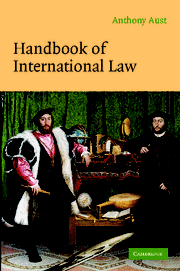Book contents
- Frontmatter
- Contents
- Foreword
- Preface
- Acknowledgments
- Table of treaties
- Table of MOUs
- Table of cases
- Glossary of legal terms
- List of abbreviations
- 1 International law
- 2 States and recognition
- 3 Territory
- 4 Jurisdiction
- 5 The law of treaties
- 6 Diplomatic privileges and immunities
- 7 State immunity
- 8 Nationality, aliens and refugees
- 9 International organisations
- 10 The United Nations, including the use of force
- 11 Human rights
- 12 The law of armed conflict (international humanitarian law)
- 13 International criminal law
- 14 Terrorism
- 15 The law of the sea
- 16 International environmental law
- 17 International civil aviation
- 18 Special regimes
- 19 International economic law
- 20 Succession of states
- 21 State responsibility
- 22 Settlement of disputes
- 23 The European Union
- Index
2 - States and recognition
Published online by Cambridge University Press: 05 August 2012
- Frontmatter
- Contents
- Foreword
- Preface
- Acknowledgments
- Table of treaties
- Table of MOUs
- Table of cases
- Glossary of legal terms
- List of abbreviations
- 1 International law
- 2 States and recognition
- 3 Territory
- 4 Jurisdiction
- 5 The law of treaties
- 6 Diplomatic privileges and immunities
- 7 State immunity
- 8 Nationality, aliens and refugees
- 9 International organisations
- 10 The United Nations, including the use of force
- 11 Human rights
- 12 The law of armed conflict (international humanitarian law)
- 13 International criminal law
- 14 Terrorism
- 15 The law of the sea
- 16 International environmental law
- 17 International civil aviation
- 18 Special regimes
- 19 International economic law
- 20 Succession of states
- 21 State responsibility
- 22 Settlement of disputes
- 23 The European Union
- Index
Summary
States are, at this moment of history, still at the heart of the international legal system.
Oppenheim. Oppenheim's International Law, 9th edn, London, 1992, pp. 119–203
Shaw, International Law, 5th edn, Cambridge, 2003, pp. 177–217.
Crawford, The Creation of States in International Law, Oxford, 1979
Brownlie, Principles of Public International Law, 6th edn, Oxford, 2003, pp. 69–101
Although international organisations, non-governmental organisations and individuals (so-called non-state actors) now participate much more in the international legal order, this is because states have given them parts to play. They still have only supporting roles. Only states have international legal personality to the fullest extent. In this chapter we will therefore look first at states and then at some non-state actors, other than international organisations.
Criteria for statehood
The accepted criteria for statehood is that the entity has to demonstrate that it has ‘(a) a permanent population; (b) defined territory; (c) a government; and (d) capacity to enter into relations with other states’. Let us take these in turn.
A permanent population. The population does not have to be homogeneous racially, ethnically, tribally, religiously, linguistically or otherwise. But it must be a settled population, though the presence of certain inhabitants who are traditionally nomadic does not matter.
Territory. Size does not matter either. At one time it was thought that countries with a small territory or population (‘mini- or micro-states’) were not eligible for UN membership. But since 1990, Andorra, Liechtenstein, Monaco, Nauru, San Marino and Tuvalu have joined the United Nations. Although they include some wealthy countries, some are very poor. Nor do the land or maritime boundaries have to be defined definitively.
[…]
- Type
- Chapter
- Information
- Handbook of International Law , pp. 16 - 32Publisher: Cambridge University PressPrint publication year: 2005



